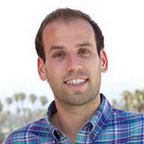Oh f**k, we actually need each other.
how this virus could change our definition of patriotism
Shit’s pretty terrible here in the U.S. — 400,000+ CoVid-19 cases (29% of the world’s cases), 15,000+ CoVid-19 deaths in the last 30 days and 17 million people have lost their jobs in the last 3 weeks (11% of the US workforce). On top of this, hundreds of millions are locked in their homes fearful for themselves & their loved ones. Hospitals are running out of supplies & are being trained on triage. Plus there’s tons of other small & large consequences rippling across the country…many of which won’t be unpacked until this is all over. Long story short, this really f**king sucks — a giant just picked up earth like a snow globe and started shaking us violently. We’re all just holding on tight, trying not to panic too much & hoping our loved ones don’t die.
This virus comes at the peak of a 20 year-long loneliness crisis — coinciding with the rise of the internet, social media, automation & overmedication. We’re the richest we’ve even been….but less happy. Sebastian Junger, author of Tribe, noted that “humans have dragged a body with a long hominid history into an overfed, malnourished, sedentary, sunlight-deficient, sleep-deprived, competitive, inequitable, and socially-isolating environment with dire consequences.” The result is that deaths of despair has been increasing at alarming rates (1).
At the same time, we’ve seen a rise in polarization.
More than ever, we now fervently oppose ‘the other side’. Ezra Klein, author of Why We’re Polarized, noted: “the last fifty years of American politics summarized: we became more consistent in the party we vote for not because we came to like our party more — indeed, we’ve come to like our parties less — but because we came to dislike the opposing party more. Even as hope and change sputter, fear and loathing proceed.” This has largely come from the bias in the political media — as Ezra says “not toward the Left or Right so much as toward loud, outrageous, colorful, inspirational, confrontational”. As a result, our attitudes towards others reflect this sensationalism — to a point where we dig our heels into our side & despise ‘the other’. We now have a majority of the country saying that the other party is a threat to the nation’s well-being.
With this rise in polarization, we’re losing our connection to people close to us. We’re losing relationships because we disagree politically — whether it’s friendships, dating or family. We hold back in our conversations and showing through our full selves. Rather than bringing us closer together, we’re farther apart.
But…something is happening in America.
Contrary to popular belief, disaster doesn’t bring out the worst in people (view study) — quite the opposite. We’re starting to see acts of kindness, generosity & sacrifice across the entire globe. Strangers are coming together to support healthcare workers, friends & family who live far away from each other are jumping on zoom calls to share hardships, neighbors are doing good deeds for those who need it, companies are learning how to trust employees to work from home and parents are spending more time with their kids.
Maybe this crisis is an opportunity.
Our heroes are shifting from billionaires & reality show stars to doctors, nurses, neighbors and grocery store workers. An earthquake survivor once commented: “an earthquake achieves what the law promises but does not in practice maintain…the equality of all men”. We’re starting to learn that, whether we like it or not, we’re in this together. With the knowledge that millions may be unaware, asymptomatic carriers of CoVid-19, we’re struck with the truth that everyone plays a part. We all have a purpose and a community to serve. We are collectively grieving a life we once took for granted — maturing as a collective society. For, as Sebastian asked, “how do you become an adult in a society that doesn’t ask for sacrifice?”
It’s time for a new kind of American Patriotism.
In this time, there’s an opportunity to hold up real heroes and use this common enemy to unite a people. We’re learning to have more empathy for the sick, the broke and those working in dangerous conditions. We’re understanding that our obsession with economic indicators like GDP are much more fragile that we thought. We’re learning that we need to rely on our neighbors — even if we disagree with them politically. We’re finding out that our identity is American, not liberal or conservative. We’re discovering that we can only solve this challenge by coming together through our collective sacrifice.
I know, I know — this all sounds too optimistic given the current state of affairs & what we hear in the media. We’re either on the brink of a full-blown fascism or about to witness a violent, socialist coup. But the arc of history takes time to bend and ultimately comes down to each one of us. If we walk away from this crisis with a newfound respect for average front-line workers, a bit more humble, and with more care for our neighbors, eventually our politics will reflect that. If we can feel a sense of purpose, an understanding for sacrifice, a sense of belonging to our community, we may feel less anxious and more content. If we redefine American Patriotism as collective sacrifice and supporting those who need it (whether it’s through private donations, personal sacrifice or government assistance), we may change our country for generations. We may realize — Oh f**k, we actually need each other.
